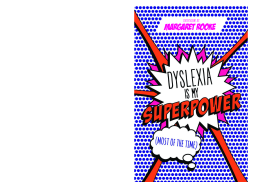
BOOK
Dyslexia is My Superpower (Most of the Time)
Margaret Rooke | Catherine Drennan | Loyle Carner
(2017)
Additional Information
Book Details
Abstract
In more than 100 interviews, children and young adults reveal their personal tips and tactics for honing the creative benefits of dyslexia, enabling them to thrive in school and beyond. Strategies include ways to develop confidence and self-belief. The contributors have outlined specific approaches they feel have helped them, and others that haven't. The book contains stunning illustrations by 8-18 year olds with dyslexia.
The first-hand accounts are inspiring in the way they normalise dyslexia and reveal the many success stories. There is an additional section for professionals who work in education or special learning environments, with advice given by school students themselves.
What a wonderful book! Kudos to Margaret Rooke for helping bring the insights and wisdom of these remarkable young people to the world. Dyslexia is My Superpower is a great read for children and parents and teachers and classrooms.
Fernette Eide MD, co-author of Dyslexic Advantage
Gr 7 Up-Rooke has collected interviews with children with dyslexia in order to share their experiences and to provide readers with an idea of best practices in and out of school. The book effectively highlights a variety of experiences with dyslexia by featuring interviews with over 100 different young people from around the world ranging from ages eight to 18. The conversations are organized around unifying themes such as achieving goals and role models. These segments are presented in the first person, lending the work an authentic and relatable tone. However, there is an unedited style to the text, which may challenge readers. Artwork by kids with dyslexia is peppered throughout. Back matter features tips from those interviewed for the book, as well as lists of what teachers should and shouldn't do to help their students with dyslexia. VERDICT This collection of interviews frames dyslexia in a positive light and would be most useful to parents and educators looking to support students with dyslexia.
School Library Journal
Margaret Rooke has more than 20 years' experience writing for national and regional newspapers, magazines and books. When Margaret's daughter was diagnosed with dyslexia at 13, Margaret began to write about and advocate for children with dyslexia.
Students with dyslexia may struggle in the education system each and every day. This book embraces dyslexia and knows that every child will unlock their potential to succeed!
Deborah Hewes, Editor of "Embrace a Different Kind of Mind - Personal Stories of Dyslexia" and DAS Head of Publicity and Publications
This book fills an important gap in the literature about dyslexia. Kids with dyslexia will see themselves reflected in the pages. I'm getting this book to share with my daughter.
John Rodrigues, author of High School Dropout to Harvard
Table of Contents
| Section Title | Page | Action | Price |
|---|---|---|---|
| Dyslexia is My Superpower (Most of the Time) – Interviews by Margaret Rooke | 5 | ||
| Foreword by Catherine L. Drennan | 11 | ||
| Foreword by Loyle Carner | 13 | ||
| Acknowledgements | 17 | ||
| Introduction | 19 | ||
| 1. Dyslexia is my superpower | 25 | ||
| 2. Learning compassion | 37 | ||
| 3. Gaining role models | 45 | ||
| 4. Being different | 53 | ||
| 5. Making me stronger | 82 | ||
| 6. Achieving my goals | 99 | ||
| 7. Boosting friendship | 117 | ||
| 8. Being talented | 128 | ||
| 9. Being diagnosed | 152 | ||
| 10. Working harder | 167 | ||
| 11. Support from school | 178 | ||
| 12. Support from \noutside school | 196 | ||
| Top dyslexia tips | 224 | ||
| Special thanks to | 235 | ||
| Blank Page |
